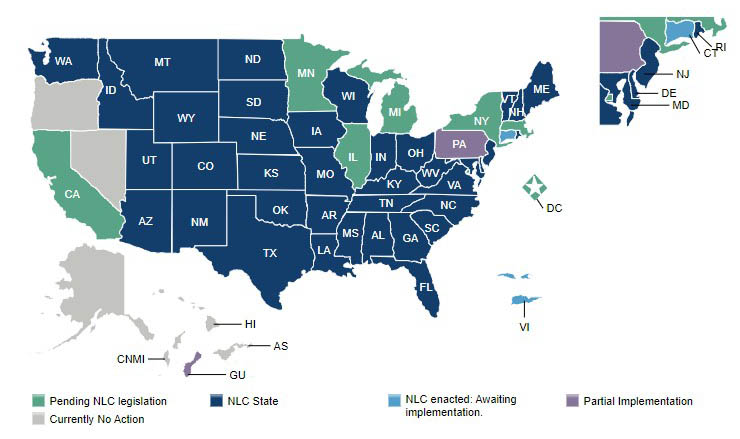Embarking on a travel nursing journey is a lucrative career choice that pairs your love of nursing with traveling, meeting new people and the thrill of being on the move. However, when the rush of excitement wanes, you may feel overwhelmed by the technicalities. The onboarding process of individual companies and the details of various laws for travel nurse licenses in each state can feel like a lot.
Vivian Health put together this travel nurse license guide to help decrease your stress when you feel overwhelmed by regulations and paperwork. We provide tips and information to help you navigate state nurse licensure rules and prepare for travel nursing successfully.
Guide to Travel Nursing and Licenses
Many facilities require you to have your nursing license for the state of practice in hand to apply for a travel nurse job. Some may let you interview beforehand, but you often can’t sign a contract without having an actual license.
As an American-trained and working nurse, you can easily obtain licensure endorsements from most states, with associated costs. If you live in a state that has implemented the Enhanced Nurse Licensure Compact (eLNC), hold a multistate license and apply for a travel nursing job in another Compact state, paperwork requirements are typically quick and straightforward. If you’re an internationally trained nurse, the process is a bit more complex and takes longer, but it’s still possible. In this article, we focus solely on nurses already working in the United States.
RELATED: 7 Things Canadian Nurses Must Know to Work in the U.S.
Most states offer temporary license options, but some only offer temporary permits to new graduates who have yet to take their National Council Licensure Examination for Registered Nurses (NCLEX-RN) or are awaiting their exam results. However, many states also offer temporary licenses to licensed nurses seeking endorsement or a single-state license while completing the process.
Travel Nursing with a Compact State License
According to the National Council of State Boards of Nursing (NCSBN), a nurse with an Enhanced Nurse Licensure Compact (eNLC) credential can practice in any other Compact state without obtaining an additional license. The NCSBN currently lists 42 states or U.S. jurisdictions that have enacted the eNLC as of June 2024, following Connecticut’s governor signing legislature to enact the Compact on May 30, 2024.

Source: NCSBN (6/10/2024)
Understanding eNLC Rules as a Travel Nurse
Some guidelines for the eNLC that are important to know include:
- You can’t hold a Compact license if your primary state of residence (PSOR) isn’t in the Compact. For example, if your home state is New York and you want to work as a nurse in Arizona, you must apply for a single-state license. However, applying for an Arizona nursing license doesn’t mean you now have a Compact license because Arizona belongs to the eNLC. Arizona isn’t your PSOR, so you don’t qualify for a Compact license within that state. Instead, your single-state license only qualifies you to work in Arizona.
- If your state is part of the Compact, you must maintain your home state licensure to continue working in eNLC states as you travel. If you lose your active licensure status in your PSOR, you’ll be required to obtain single-state licensure in each state of practice. We don’t recommend letting your Compact license lapse because it’s much easier and less costly to travel between states when you maintain active status.
Single State License and Travel Nursing
From this point forward, we use “licensure” to mean obtaining a single-state license. Single-state licensure requires the most paperwork and advanced planning, which may feel more stressful. There’s an overwhelming amount of information related to travel nurse license requirements you must collect and keep track of for each state’s licensure period.
If you’re already licensed in another state, make sure you apply for “licensure by endorsement.” Endorsement means that the state where you’re currently registered is endorsing or approving your application, which means you don’t need to retake the NCLEX to get your license.
Keeping Organized while You Apply for Travel Nurse Licenses
When you start applying for licensure, making a written list of everything required and in which order you should submit documentation is a good idea. I’ve personally applied for many different licenses, and I keep a folder on my phone for all my essential nursing documentation that’s usually requested. This folder makes locating and sending necessary information easy, which I usually send by email.
Many states also have online checklists to help you. These premade lists make it simple to follow along and check things off as you submit them or make notes as you go.
Renewal Dates Impact Where You Want to Travel Nurse

You might be tempted to apply for multiple licenses, in case you don’t secure a job in your state of choice. Some states, like Colorado and Washington, have strict renewal periods that make it quite expensive to get both licenses when you’re unlikely to use them within the same period.
The Washington Board of Nursing renews licenses annually according to birthday. So, if a person applied now with a birthday in December, their license would expire in December 2024, but someone with a birthday in March would expire in March 2025. Checking renewal dates is critical when obtaining a new license.
For example, I’m heading on a travel contract set to start May 20. My recruiter asked me to obtain my license during our discussions in March, but the renewal was in April. This renewal date was a good catch on my end. I applied in April to avoid any extra charges. Obtaining a license and then realizing it expires before you actually start your travel contract is annoying and expensive.
Read the rules and regulations of each state’s licensure very carefully and ensure you’re up to date with your continuing education requirements, which may differ by state. Some odd rules regarding renewal dates and what you must provide to obtain a license can slip in. The more information you have, the better.
Background Checks and Fingerprinting Requirements
Each state has different requirements for background checks and fingerprints. Almost all states require a background check, and the processing time varies greatly. Research and ensure you have enough time to complete this before obtaining a license. However, only some states require fingerprinting.
You can usually complete fingerprinting in two ways: hard copy on an FBI or a Department of Health fingerprint card or visiting an agency that processes digital fingerprints. Some nursing boards won’t allow you to apply with digital fingerprints if you’re out of state, and some require you to use a fingerprint card sent directly from them.
If you need to complete a hard card, it’s best to go to the police station. Police officers have the most experience rolling fingerprints, increasing your likelihood of acceptance. I’ve never had a card rejected, but I’ve heard stories of nurses having to submit two or three cards before acceptance.
If you go the digital path, each state typically stipulates which agencies you can use, and there’s a processing code you must obtain before scheduling an appointment. You may get this code from the nursing board in the state you’re applying to, or occasionally, you can find the code online. Sometimes, a phone call is necessary, but if you’re lucky, the fingerprinting agency will have a system for you to look it up. If at all possible, stick with the digital fingerprints. They have a far lower rejection rate, and the process is much faster than hard copies.
To complete fingerprinting, you need a state-issued driver’s license or international passport with a name matching the name on your application. Be sure to bring this to the appointment with you. For a background check, you usually need to know all your addresses for the past one to two years. However, only addresses you physically changed on your driver’s license count.
Each Board of Nursing (BON) has clear rules about when you must submit your fingerprints and background check and how long the documentation is good before you must redo it. Typically, the timing should work out if you apply for a nursing license and then obtain your background check and fingerprinting.
Required Documentation for Travel Nursing Licensing
States provide applications online, on paper or both. You can even walk into the BON offices in some states and apply in person. The documentation you provide with your application must be complete. Make sure you double-check the requirements to ensure you’ve fulfilled them all.
Almost all states require you to verify your current nursing license, and nearly all of them use NURSYS, a national nurse licensure database. NURSYS is a convenient, pay-for-service system that lets you send online verification to multiple states.
You’re usually only required to send verification of one active license. However, certain states require you to report all nursing licenses you’ve ever held. In these cases, having old copies of all your licenses in one easy-to-find spot makes it quick and simple to provide this information.
Other possible mandatory documents include transcripts (may need to be official and sealed), a declaration of residence form and affidavits or proof of education related to infectious and communicable diseases.

Licensure Fees and Travel Companies
Licensure fees vary from state to state, so we won’t address specific state fees. You can find this information by searching each BON’s website for associated application fees or browsing state-specific nurse licensure information on Vivian Health.
Besides application fees, you also have charges for fingerprints/background checks, license verification, official transcripts and potentially any required education you haven’t completed. Plan for these payments in advance and avoid the hit to your bank account.
Most agencies will reimburse you for the associated costs of obtaining a license or at least the license fee. You can negotiate this with your recruiter and ensure they include it in your contract. However, you only get paid back for the state where you take a contract, usually after you finish the contract. If your agency isn’t willing to reimburse you, it may be worth exploring another recruiter or nursing agency.
One of the biggest lessons you’ll learn with travel nursing is that if it’s not in your contract—it doesn’t exist. This motto covers all housing, per diem rates, overtime, patient assignment, etc. Your contract is your guide and agreement. Save all your receipts and credit card/bank statements from any charges you incur. I take a picture or screenshot of receipts and save them in a folder on my phone for easy access. You can easily transition between assignments with careful preparation and attention to detail.
I’ve just received confirmation of my license for my upcoming contract in May. Although getting all the documentation ready and sent to the state nursing boards can seem daunting, the excitement about heading on a four-month travel assignment with my family is always worth a little stress and all the fees. My company will cover the costs once I finish my first contract with them—yes, that’s written in my contract.
Explore which states align with your travel and salary goals. Download the Vivian app to easily stay updated on job opportunities and recruiter connections.










Thanks for the info.